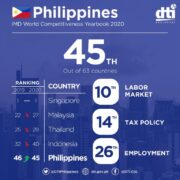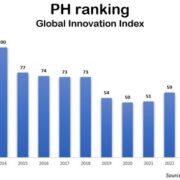The Philippines maintained its momentum with a slight upgrade—moving from the 46th to 45th spot in this year’s global competitiveness rankings by the International Institute for Management Development (IMD). The 2020 World Competitiveness Yearbook (WCY) by IMD also signaled an encouraging assessment of the country’s climbing competitiveness from a dip in 2018.
The IMD ranking measures the capacity of a country to maintain an environment where enterprises can compete locally and internationally as it assumes wealth creation happens at the enterprise. The ranking was evaluated using the 2019 country measures and perception-based survey from business executives performed in the first quarter of 2020.
The Philippines is the only one among Southeast Asian countries, aside from Singapore, that improved its ranking year-on-year. In terms of growth, the Philippines is consistently among the top performers in the region with an average growth of 6.6% from 2012 to 2019 and posting 6% in 2019, while Malaysia registered 4.3%, Thailand 2.4%, and Indonesia 5%.
With this announcement, DTI Secretary Ramon Lopez pointed out that: “The Philippines stands on solid ground and has the momentum to overcome the current crisis.”
Across the different pillars, the country’s major strengths are real GDP growth, long term unemployment, real GDP growth per capita, gross fixed capital formation, effective personal income tax rate, compensation levels, high-tech exports, mobile telephone costs, and ICT service exports, among others. These are aligned with the perception survey that showed the country’s skilled workforce, economic dynamism, open and positive attitude of management, high educational level of the workers, and cost competitiveness are still the top five key factors that make the Philippine economy attractive to investors.



Indicators that yielded the highest improvements included labor force, employment, consumer price inflation, patent applications per capita, distribution infrastructure, among others. Fiscal policies like the implementation of tax reform measures contributed to the Philippines’ high ranking in tax policy (14th). Moreover, successful reforms in the improvement of labor market conditions through the active implementation of small and medium-enterprises (SME) promotion and heightened government support for technical-vocational education and training, among others, enabled the Philippines to retain its 10th place position in the Labor Market indicator, the highest sub-factor for the country.
The trade chief assured that despite the socioeconomic difficulties arising from the COVID-19 crisis, the Philippines demonstrates resilience, flexibility, and adaptability for both the public and private sectors as they face the challenges head-on.
He also said that the Philippine government, through the Department of Trade and Industry (DTI), continues to take an active role in nation-building and economic development through the Inclusive Innovation Industrial Strategy (i3S), which aims to grow globally competitive and innovative industries.
Through i3S, DTI puts innovation at the front and center of its policies, especially as it intensifies efforts to pursue digital transformation and embrace Industry 4.0 new technologies. This is important as the country restarts the economy under the new normal of the COVID-19 pandemic. DTI also recognizes the vital role of a vibrant and enabling innovation and entrepreneurship environment in sustaining economic growth and job creation in the future.
Sec. Lopez said, “DTI remains motivated to work even harder to build a stronger, healthier, and more inclusive nation. Through the resumption of the ‘Build, Build, Build’ Program, we can pump-prime the economy and by implementing programs to reskill and upskill our workforce along with activities to improve the competitiveness of cities and municipalities, aggressive investment promotion, and continuing support to MSMEs and other vulnerable sectors, we can help mitigate the economic impact of the COVID crisis.”
“This is a pivotal moment as the crisis has presented opportunities to be more creative and build more resilient industries by repurposing manufacturing, using more data, artificial intelligence, Internet of Things, and accelerating digital adoption with all the startup work and tech innovation building up in the country, we are ready to expand our horizons and help the economy bounce back quickly,” Undersecretary Rafaelita Aldaba said.
Sec. Lopez further said: “As we enter 2021, the country will strongly recover from the difficulties brought about by this pandemic while being cautious of the challenges and risks that lie ahead in the new normal. The Philippines must be agile to accelerate reforms and pursue impactful economic policies to sustain the country’s growth momentum and competitiveness moving forward.”
—
Stay updated with news and information from the Department of Trade and Industry by visiting their website at dti.gov.ph.






